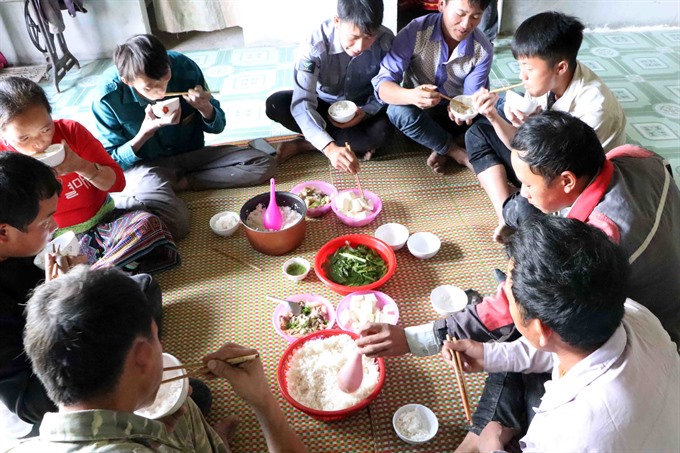 Society
Society

Drinking is common among Mông people in Khun Há Commune, Tam Đường District. Local men in the village used to drink heavily. This is among major causes of poverty, domestic violence, and social disorder in this community. However, things are getting better.
 |
| Residents enjoy a meal without alcohol at Lao Chải 2 Village, Khun Há Commune in the northern province of Lai Châu. - VNA/VNS Photo Công Tuyên |
LAI CHÂU – Cứ A Tráng, a man from the Mông ethnic minority in Lao Chải 2 Village in the northern province of Lai Châu stands in front of his newly-built house. The house has one floor and covers an area of about 100 square metres.
Tráng was able to build the property after giving up drinking and focusing on farming.
Tráng said quitting booze has improved his life.
“I no longer had to pay for alcohol. Instead of getting drunk, I spent time growing cardamom and rice, or raising poultry and cattle to improve my income and build a better life,” he said.
Now he reminds his family of the harm caused by alcohol.
Drinking is common among Mông people in Khun Há Commune, Tam Đường District. Local men in the village used to drink heavily. This is among major causes of poverty, domestic violence, and social disorder in this community.
However, things are getting better.
There are 62 households in Lao Chải 2 Village. All were Mông ethnic minority families living in poverty.
After three years battling alcohol addiction in the village, more than 20 households have managed to raise themselves out of poverty. Many have built their own homes and purchased modern appliances.
Cứ A Sáu, another H’Mông man in Lao Chải 2 Village, said although alcohol was still consumed at weddings, funerals and festivals, the rate of daily drinking had dropped, with some residents even quitting completely.
Cứ A Sở, chairman of Khun Há Commune’s People’s Committee, said residents of three among 15 villages in the commune now said no to alcohol during daily meals.
The committee would try to persuade residents in other villages to change their drinking habits. This will help improve the lives of residents and stop social problems caused by alcohol addiction. – VNS




